NSF grant helps first-year PhD student research low-income communities and nonprofits
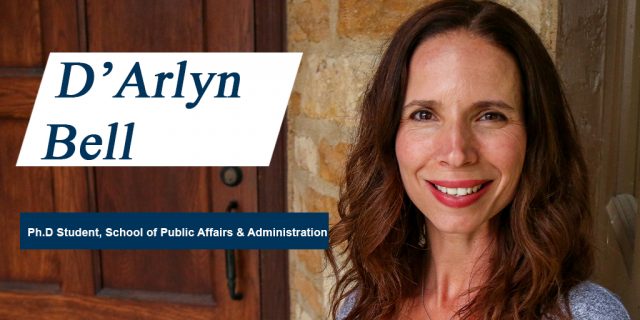
In the School of Public Affairs and Administration, students from every background are shaped into exceptional leaders for public service who provide solutions to the most pressing community challenges at all levels of governance. Ph.D student D'Arlyn Bell is currently working to strengthen the voices of lower income communities to offer diversity, resilience and knowledge where it's needed most.
What are your research interests and why did you choose them? Was there a moment when you decided this is what you wanted to study? What was that journey like?
My research primarily focuses on the relationship between low-income communities and nonprofit organizations. I’m interested in the interactions between nonprofits and the people they serve that create community, creativity and political capacity. I am developing a research agenda that challenges conventional narratives about poverty, poverty governance and political apathy in and among populations thought to be socially and political disengaged. One dimension of my research is designed to elevate the voices of these communities and offers a counter narrative highlighting the diversity, resiliency and knowledge embedded in marginalized populations. With my current project, I am studying nonprofit legal structures, tax-law, and funding relationships to understand the variables the contribute to nonprofit political mobilization and advocacy. I am analyzing how nonprofit administrators interpret tax-law restrictions on political activity and am conducting a case study analysis to understand if legal interpretations are changing in relation to increased political polarization and growing economic inequality.
I think for a lot of us, we are naturally drawn to research interests that help us come to terms or make sense of confounding things we’ve seen or experienced. For me, my research focus directly connects to my experiences growing up in the inner-city and in deep poverty. I never intended to pursue a PhD, but I’ve always been a shameless nerd, albeit a somewhat radical nerd. I originally wanted to do nonprofit work with inner-city kids doing art, music and being outside in nature. My family is Cherokee Native American, and so I was also interested in working with displaced urban Indians and Natives off the reservation.
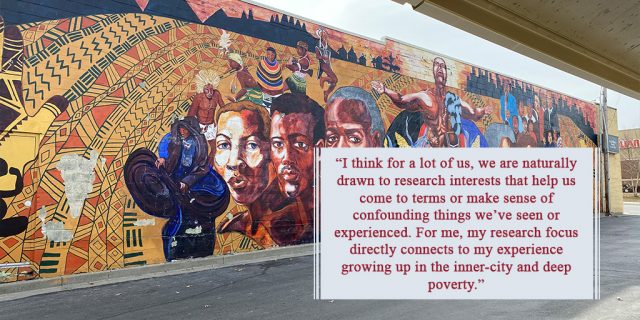
But, there was this moment during undergrad when I realized that really intelligent researchers and scholars actually care and study injustice and inequality. This was really profound for me because when you grow up poor, you don’t think academic type people really care about what’s going on in places like that. My coursework exposed me to all this literature and research that spoke so accurately to things I had seen and experienced. I just thought, I want to do that! I can do that! I remember thinking, what if I throw my lived experiences in with some theories and methods and see what happens. So far, so good. Now I’m an academic type person, which is not without some irony to me.
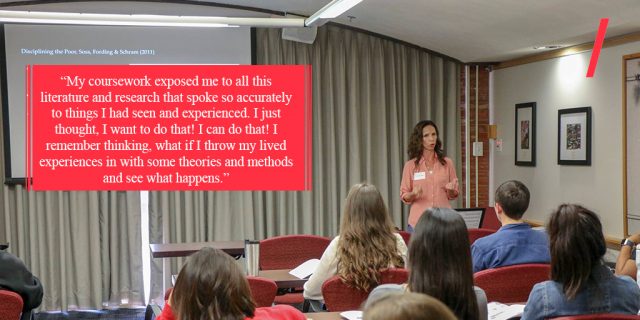
Tell us what your PhD thesis is in under 200 characters, make it Twitter-friendly:
I research nonprofits, the people they serve, and the interesting things they can do together.
What is one thing you think everyone should know about your research project or research interests? This might be a commonly held belief that your research questions or complicates
Poverty is rampant in rural areas, but my research so far has focused primarily on the inner-city. Many urban areas are only thought to be places of destitution and crime, which is such an offense to the people living here and is simply untrue. Much of my fieldwork has been drawn from a community with important history, art, diversity and culture. One of the fields I’m mapping includes places like the Quindaro Ruins with connections to the underground railroad and the Wyandot Native Indian Tribe’s sacred burial grounds. My field also has murals and street art, views of downtown, beautiful architecture, hidden pubs, coffee shops, ethnic enclaves and religious groups from all over the world. Inner cities are complex, dynamic and living places with extremely interesting and resilient people. Yet, most of the people who live here are usually very poor and suffer externalities of systems and structures that perpetuate economic and social inequality, particularly for communities of color.
People will talk all day about the art, creativity and culture of poor communities, which often gets coopted and marketized by the middle and upper-class without proper attribution or compensation. But, as soon as we start talking about “the poor” and the government’s relationship and responsibility toward them, the discourse radically changes to conversations about deservingness and moral worthiness. The reality is “the poor” are also artists and intellectuals, they are also living historians and creators of culture. Most importantly, “the poor” are not usually poor because they don’t want to work or are lazy. Most are working, but opportunities are extremely limited and with very low wages.
So many people in these communities have had negative experiences with government policies and the institutions of government. This creates a tremendous amount of distrust, which is not the same as apathy. Social service nonprofits are very interesting quasi-governmental organizations. They are responsible for delivering a large part of the welfare state. Yet, unlike the government, they are generally considered trusted community partners. This is one of the important reasons I study them.
Where are you conducting your research? In archives? In laboratories? What are your sources?
I had the opportunity to experiment with some ethnography in previous research, which was incredibly rewarding and added depth and clarity to my work that I don’t think I could have achieved otherwise. I would love to do more ethnography in the future. At this point, my research is being drawn from semi-structured interviews with nonprofit administrators and individuals in the communities they work with. I am about to switch directions with my current project and will be doing interviews with advocacy organizations and legal strategists who are working to build political capacity in the nonprofit world. I also do a fair bit of content and document analysis and will be developing some interesting work with my adviser and others I’m working with. I really like qualitative methods and I think it will be fun for me to learn process tracing, critical discourse analysis, and develop a digital media component that could be an extremely important complement to my core research.
What advice would you give students applying for research funding opportunities?
My advice would be to shoot your shot! I don’t really fit the conventional profile of a fellowship recipient. I’m a nontraditional student and fellowship opportunities are not necessarily targeted at my subset of the academic population. That sends a strong message to us, which you should absolutely ignore! I’d also add that crafting grant or fellowship applications early is key to developing a high-quality proposal. I started putting together material for my NSF proposal 5 to 6 months before the application was due. Also, and probably most important – let you work be critiqued. I mean, really critiqued! It is so crucial to understand that that developing ideas takes a lot of deconstruction. You have to let trusted advisors, mentors and colleagues challenge you and tell you the truth about that fascinating tangential thought that you spent way too much time developing that ended up being completely irrelevant. Find people you trust and listen to their advice about your work.
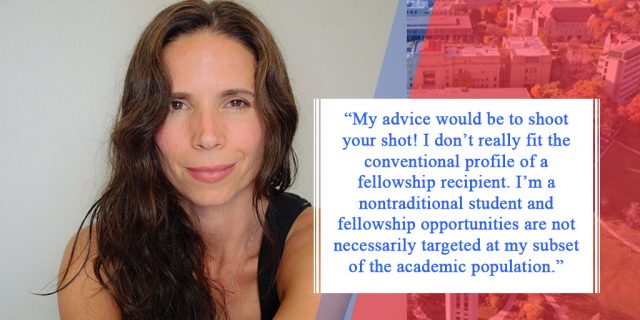
Give a shout-out to a professor, mentor, advisor, or someone at KU who has helped you?
I want to recognize three gems that have been crucial to my development and have contributed to my overall happy heart while I’ve been here at KU. Foremost, my advisor in the School of Public Affairs and Administration Chuck Epp has been such a valuable resource for helping me think and understand my work. Chuck is a brilliant, accomplished scholar and intellectual, but he is also an extremely kind and wonderful person that I am privileged to work with.
Ben Merriman, also kind and incredibly brilliant, and also in my department, has been a very important teacher and mentor to me. Ben creates space for me to ask him anything and lets me ramble on about every ridiculously random thought that happens to be running through my mind when I pass by his office.
Last, but certainly not least, Mulu Lemma with the McNair Scholars Program. Mulu is an unsung hero at KU and I would really like for people to know what a tremendous difference she is making in the lives of countless scholars and future researchers navigating this very strange place in academia. Does KU know about Mulu Lemma? Because if you don’t, please find her and give her the credit she deserves for her tireless commitment and love she shows to the students she serves. Additionally, as I make my way around KU, I’m also getting to know my colleagues and faculty within and outside of my department that make KU a more interesting place to be.
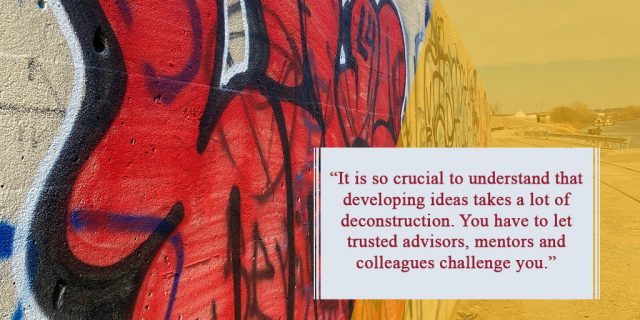
What is the most valuable experience you have had while studying at KU?
The most valuable experience I’ve had at KU has been my field work. My research confirmed what I already knew: people who struggle and constantly have to negotiate the space at the bottom of social and economic hierarchies are resilient and incredibly powerful, even if they don’t know it. Their power is of a different sort than what we might generally conceive. I have been incredibly humbled and so thankful for the stories and perspectives I’ve collected in my work so far and it is my intent to find a way to continue to illuminate the history, culture, creativity and knowledge in areas that are often dismissed and frequently maligned.
What do you plan to do after you graduate from KU?
After I graduate, I hope to stay in the academy and find my way to the tenure track. Staying in higher education will allow me to continue to write, study, and teach. I cannot imagine a better job than getting paid to do what I love and create knowledge with interesting, engaged, and thoughtful people.
What motivates you?
Problems and unexplored potential.
Be like D'Arlyn! Explore what you're most passionate about. For more information, explore the School of Public Affairs and Administration, Political Science, Literatures and Culture, and Study Abroad and Global Engagement at the University of Kansas. Also see the McNair Scholars Program, NHLIC Research, and the U.S. Department of Health and Human Services.